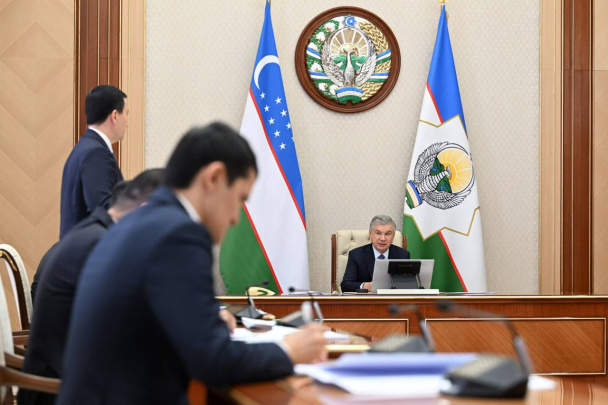IMF: Economic recovery of Uzbekistan will largely depend on vaccine rollout

Фото: РИА Новости
Although the pandemic hit the economy of Uzbekistan hard in the first half of 2020 and inflicted considerable hardship, the recession was moderated by strong and timely containment and support measures, Ron van Rooden, head of the IMF remote mission, said in a statement.
The measures included an effective public health response and the deployment of a set of fiscal, monetary, and financial measures, made possible by substantial buffers owing to prudent macro-economic policies in preceding years, and thanks also to sizable international support.
“This strong policy reaction allowed for a sharp rebound in activity in the second half of the year, while the agricultural and construction sectors showed resilience throughout the year. This resulted in Uzbekistan being among the few countries posting positive overall growth in 2020, at a rate of 1.6 percent, although this was still about 4 percentage points less than the growth rate projected prior to the pandemic,” Ron van Rooden said.
According to the statement, the authorities’ large support package was timely and well-targeted.
“The amended 2020 budget included sizable additional spending on health care, social assistance and investment, as well as support for businesses, including through tax relief and financial support. The actual uptake was less than expected, in part reflecting the faster-than-expected turnaround in activity, as well as some delays in investment spending, resulting in an overall fiscal deficit of about 4½ percent of GDP in 2020, or some 2½ percentage points less than envisaged in the amended budget. The Central Bank of Uzbekistan (CBU) lowered its policy rate and provided additional liquidity to banks, thus supporting overall liquidity and credit. Banks were encouraged to allow firms and households to defer loan payments, providing sizable financial relief. Inflation continued to fall, although higher food prices kept overall inflation in the low double digits, ending the year at just over 11 percent,” the statement reads.
It is noted that growth will pick up further in 2021, but the level of uncertainty remains high and the recovery will depend especially on vaccine rollout.
“With the rollout of vaccines globally, the expected recovery of trading partner growth, and building on the domestic recovery in the second half of 2020, the economy is projected to grow by about 5 percent in 2021. The recovery could be delayed, however, by a resurgence of infections, a slower-than-expected rollout of vaccines, or possible new containment measures, as well as slower growth in Uzbekistan’s main trading partners and fluctuations in commodity prices, notably the price of gold. Given the current funding constraints of the World Health Organization’s COVAX program, the authorities rightly aim to secure vaccines from other sources as well,” the statement said.
The recovery will also depend on continued economic policies to protect lives, support growth, and mitigate economic scarring from the pandemic.
“It is no time to let up. The 2021 budget appropriately maintains an accommodative fiscal policy stance, allowing an overall fiscal deficit of up to 5½ percent of GDP, including by ensuring that health care systems and vaccines purchases and distribution are adequately resourced, while social assistance is further expanded. Wage increases to catch up with inflation, which had been delayed in 2020, will also help support demand. Should downside risks materialize, additional support would be warranted. Notably, there is room to expand fiscal support further, by raising targeted transfers to vulnerable households and viable firms and accelerating public investment plans. As unemployment and poverty have increased due to the pandemic, there is a need to further expand the coverage of the social safety net, while improving its targeting,” Ron van Rooden says in his statement.
He also highlighted the following points in the statement:
- The higher budget deficit this year can be offset by a gradual fiscal consolidation in subsequent years;
- The CBU’s monetary policy stance remains appropriate;
- The CBU should closely monitor the banking system, as the full impact of the pandemic on its financial health is likely yet to be observed;
- The authorities not only face the challenge of supporting the recovery, but also continuing with Uzbekistan’s transformation to a modern market economy;
- Structural reform implementation needs to be accelerated to lay the basis for strong, sustainable, and more inclusive economic growth;
- Improving incentives, institutions, and inputs are key to creating a vibrant private sector and attracting more private investment;
- The successful implementation of the reform agenda will require the steadfast determination of the authorities, but also the continued support of the international community.
“The IMF stands ready to continue to support Uzbekistan in these efforts with policy advice, technical assistance, and financial assistance if needed,” Ron van Rooden concluded.
Related News

14:15 / 25.02.2026
Uzbekistan’s public debt rises 16.5% year on year to $46.8bn

12:50 / 21.02.2026
President Mirziyoyev backs extension of tax relief to accelerate Karakalpakstan’s industrial growth

20:24 / 20.02.2026
Central Bank survey shows downward trend in public inflation expectations

20:44 / 17.02.2026



